

Roosevelt Room. The Art & Décor of the State Floor Entrance Hall Cross Hall East Room Green Room.
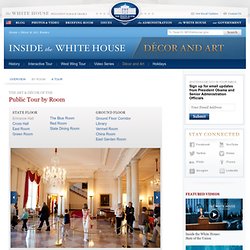
Big Stick ideology. The letter in which Roosevelt first used his now famous phrase Usage Although used before his presidency, Roosevelt used military muscle several times throughout his two terms with a more subtle touch to complement his diplomatic policies.
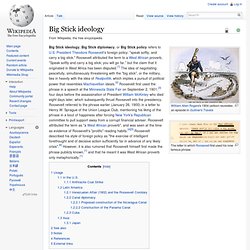
This included the Great White Fleet, 16 battlecruisers which peacefully circumnavigated the globe as an illustration of America's rising yet neutral prestige under Roosevelt's direction. In the U.S. Anthracite Coal Strike Latin America Venezuelan Affair (1902) and the Roosevelt Corollary In the early 20th century, Venezuela was receiving messages from Britain and Germany about "Acts of violence against the liberty of British subjects and the massive capture of British vessels" who were from the UK and the acts of Venezuelan initiative to pay off long-standing debts.[10][11] After British and German forces took naval action with a blockade on Venezuela (1902-1903), Roosevelt denounced the blockade. Canal diplomacy. Russo-Japanese War. The Russo-Japanese War (8 February 1904 – 5 September 1905) was "the first great war of the 20th century.
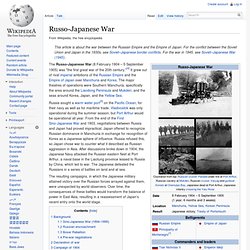
"[4] It grew out of rival imperial ambitions of the Russian Empire and the Empire of Japan over Manchuria and Korea. The major theatres of operations were Southern Manchuria, specifically the area around the Liaodong Peninsula and Mukden; and the seas around Korea, Japan, and the Yellow Sea. Russia sought a warm water port[5] on the Pacific Ocean, for their navy as well as for maritime trade. Vladivostok was only operational during the summer season, but Port Arthur would be operational all year. Treaty of Portsmouth. Negotiating the Treaty of Portsmouth (1905) — From left to right: The Russians at far side of table are Korostovetz, Nabokov, Witte, Rosen, Plancon and the Japanese at near side of table are Adachi, Ochiai, Komura, Takahira, Satō.
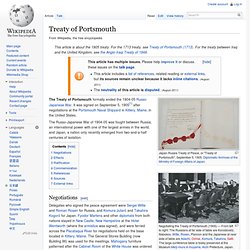
The large conference table is today preserved at the Museum Meiji-mura in Inuyama, Aichi Prefecture, Japan. The Treaty of Portsmouth formally ended the 1904-05 Russo-Japanese War. It was signed on September 5, 1905[1] after negotiations at the Portsmouth Naval Shipyard in Kittery, Maine, in the United States. The Russo-Japanese War of 1904-05 was fought between Russia, an international power with one of the largest armies in the world, and Japan, a nation only recently emerged from two-and-a-half centuries of isolation. Negotiations[edit] The peace conference began when President Theodore Roosevelt invited both countries to conduct direct negotiations at the neutral site of Portsmouth, New Hampshire.
Effects[edit] Ratification[edit] Commemoration[edit] Sources[edit] Nobel Peace Prize. The Nobel Peace Prize (Norwegian and Swedish: Nobels fredspris) is one of the five Nobel Prizes created by the Swedish industrialist, inventor, and armaments manufacturer Alfred Nobel, along with the prizes in Chemistry, Physics, Physiology or Medicine, and Literature.
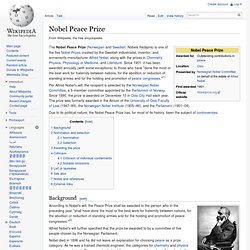
Since 1901, it has been awarded annually (with some exceptions) to those who have "done the most or the best work for fraternity between nations, for the abolition or reduction of standing armies and for the holding and promotion of peace congresses. "[1] Per Alfred Nobel's will, the recipient is selected by the Norwegian Nobel Committee, a 5-member committee appointed by the Parliament of Norway. Since 1990, the prize is awarded on December 10 in Oslo City Hall each year. Due to its political nature, the Nobel Peace Prize has, for most of its history, been the subject of controversies.
Background[edit] Nobel died in 1896 and he did not leave an explanation for choosing peace as a prize category. Nomination[edit] Theodore Roosevelt. When Roosevelt's first wife, Alice, died two days after giving birth in February 1884 and when his mother died the same day in the same house, he was heartbroken and in despair.
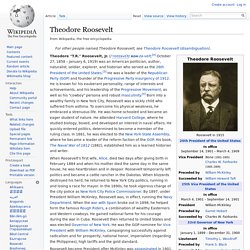
Roosevelt temporarily left politics and became a cattle rancher in the Dakotas. When blizzards destroyed his herd, he returned to New York City politics, running in and losing a race for mayor. In the 1890s, he took vigorous charge of the city police as New York City Police Commissioner. By 1897, under President William McKinley, Roosevelt was, in effect, running the Navy Department. When the war with Spain broke out in 1898, he helped form the famous Rough Riders, a combination of wealthy Easterners and Western cowboys. Roosevelt became President after McKinley was assassinated in 1901.